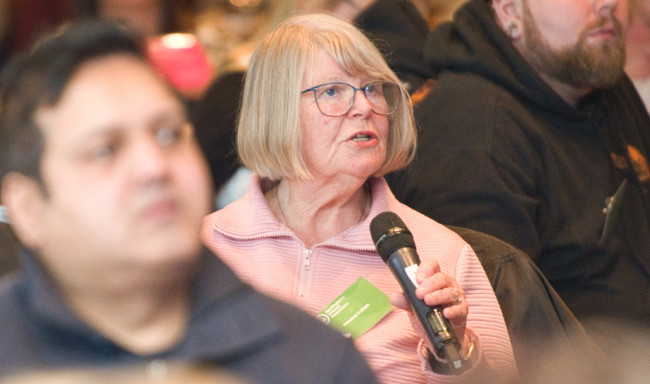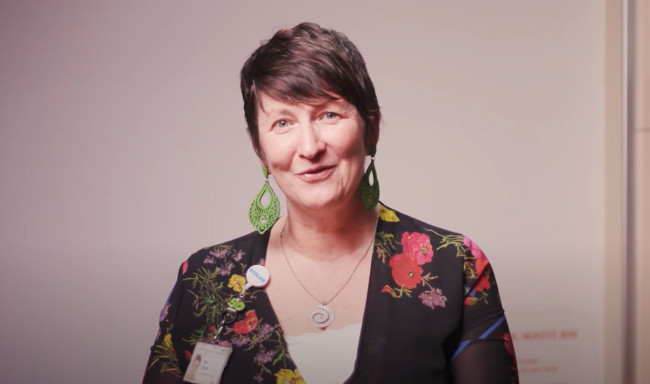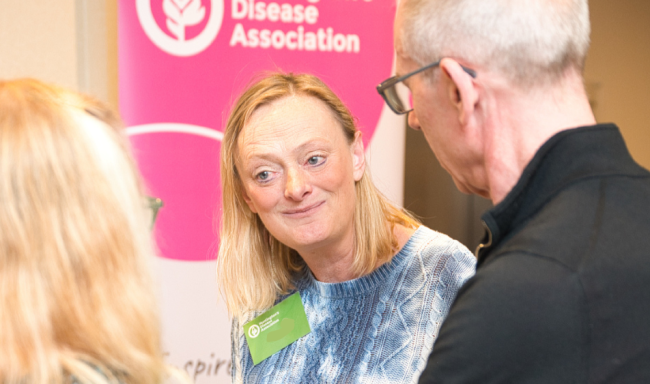Talking with your child about Huntington's for the first time can be worrying - but we're here to support you.
We spoke to James, the Team Leader for the Youth Engagement Service - HDYES to hear more about how HDYES can support you and your children. He also shares his views on how and when is best to have these conversations. The resources that James mentions throughout the blog can be found at the bottom of the page.
Please tell us a little about your role within the charity
"I’m the team leader for the youth engagement service. We offer direct support to anyone aged 8-25 who has Huntington’s disease in their family. We also support parents and work with professionals to ensure that the young person’s voice is heard and everyone feels confident in supporting them. Alongside my youth work role, I manage the team and help to keep the service on track so we’re best placed to support as many young people affected by Huntington’s as we can."
How can HDYES help support parents and children affected by Huntington’s disease?
"In some instances, we can be there from the start of a child’s Huntington’s journey. We support parents in having initial conversations about Huntington’s so they feel more confident in starting the conversation and the language they use. We’re then just a phone call away from supporting parents with any challenges or just checking in to see if there’s any other advice we can offer. We have resources that we can give to parents such as our Understanding Huntington’s: children’s workbook, which is designed for primary-aged children to complete with a parent or trusted adult. From eight years old, we can work directly with children and we have an open referral policy meaning people can access as much support as they like until they are 25. We also run two courses for parents, our Parents of adult children at risk course is aimed at supporting parents whose children are at a point in life where they are considering testing, family planning and their finances. Whereas our Navigating Huntington’s course is for parents whose children are under 18 and how they can best support them as they grow up with Huntington’s in the family."
"Our work with our children and young people is our priority and we generally have one-to-one sessions in school but we can meet people anywhere they feel comfortable, like home or a nearby café. We do various exercises and activities in our one-to-one sessions, ensuring that there is something for everyone. Life is bigger than Huntington’s so we’re open to supporting our children and young people with anything we can and also recognise that sometimes, the best thing we can do is listen and let people vent. We all cover really big areas so we still offer video and telephone calls as well as being able to chat over messages because we can’t always see people straight away if they request it. We try to see people at least once every three months and so training others on Huntington’s can be a good way of ensuring school, employers or other professionals have a good understanding of what our children and young people are facing on a daily basis. We also have our ‘Huntington’s disease: Teacher’s guide’ which is a useful tool that we can send as a hard copy or families can send as a digital copy to school."
How can parents utilise HDYES to help both them and their children at home or in school?
"Parents can contact their local youth worker at any time to arrange video/phone call or to meet in person if that’s the best option. We can discuss how best to initiate conversations about Huntington’s (whether that’s for the first time or as an ongoing conversation), what language is most appropriate depending on their circumstances and help to unpick any tricky situations or queries they have. We don’t know our children and young people as well as their parents do so it’s a great opportunity for us to understand how we can best support the family as a whole."
Why do you feel that being open and honest with children about Huntington’s disease is so important?
"It helps to build a shared reality so that children and young people aren’t fearing the unknown. Children will pick up on things and often create a scenario in their mind that is worse than reality so the more they understand and the more comfortable and confident in asking questions they are, the more this will ease."
Huntington’s disease has been surrounded by stigma and it’s so important we all do our part in breaking this down. Having open and honest conversations with children helps them to see that there is no reason to keep Huntington’s hidden.
What would you say to a parent who asks - when is the right time to tell my child?
"There is no right time, meaning that there is no wrong time either. But there are better times! The younger a child is the easier it is for them to assimilate information and to accept Huntington’s. To use a cliché, children take things in their stride and a big part of that is that they are constantly growing and are better able to accept what is happening around them because they're developing their understanding of what’s around them. All relationships are built on trust and by withholding information, you risk damaging that trust so it’s always better to be open and talk about Huntington’s when your child is young or as soon as you’re able."
We do believe that telling children about Huntington’s when they are young is the best approach. It takes away some of the pressure on parents because there’s no expectation or need to tell a young child everything so they can drip-feed information and be led by their child as they will likely ask questions as time goes along.
What would be your top tips when it comes to talking to children about Huntington’s?
"The most important things to remember are to be honest and to keep the conversation open. Huntington’s is a moving picture and people’s level of understanding changes as well as their desire of what they want to know. If your children are young then it’s a good idea to keep things very simple and say things like ‘Huntington’s is a brain disease that changes the way a person moves, thinks and behaves.’ Before building on this knowledge and explaining in more depth using examples of how a person with Huntington’s might find it difficult to have a conversation or stay calm. A fear for many parents is talking about their child’s chances of inheriting the gene and the mortality of Huntington’s. It’s always best to be honest and considerate in the way that you share this information or answer the questions. For example you could say ‘Huntington’s isn’t something you can catch like a cold. You won’t get it from giving cuddles or sharing anything. Huntington’s is something that can be passed down from parents but it’s something that you don’t need worry about at the moment.’ Again, this is a good foundation to build on their knowledge as they get older or ask more questions about genetics. Context around life expectancy is a helpful way to explain to children that whilst their parent is going to die, it might not be for a long time. For example ‘People usually live with the symptoms of Huntington’s for about 20 years. If you’re eight now, then these are some of the things that are going to happen over the next 20 years…’ and you can list things like finishing primary school, doing GCSE’s, learning to drive, getting a job, having a partner, moving out etc. These things will feel a long way off to your child and so it will help them to realise how long people with Huntington’s can live for."
What resources would you recommend to help with talking to children about Huntington’s disease?
"We have quite a few and there are more from other organisations too. We have our guides: Understanding Huntington’s: children’s workbook and our Teenager’s guide to Huntington’s disease, which can be ordered from our operations team or any of our HDYES or Specialist Adviser team can get for you. I did a webinar in 2020 which can be found on our YouTube channel and then we have our courses as well which run annually. I’m probably a bit old-fashioned in some ways though and I always think talking to someone directly is the best option so please do get in touch with your local youth worker as we’re happy to talk things through and tailor a plan that works best for your family."
"The internet and google can be a scary place for children and parents alike so be upfront about using it and explain that it’s not the best place to learn about Huntington’s. Tell your kids they can ask you anything and that you’ll always make time to talk about Huntington’s. You can always sit down with them and look at online resources together, like HDYO, so they know where to look for information if they do want to look online."
Make the most of what’s available to you and your family. The Huntington’s Disease Association and our various teams are all here to help and support however we can so don’t hesitate to get in touch with any of us.
Resources
Below are the resources that have been mentioned in this blog.




